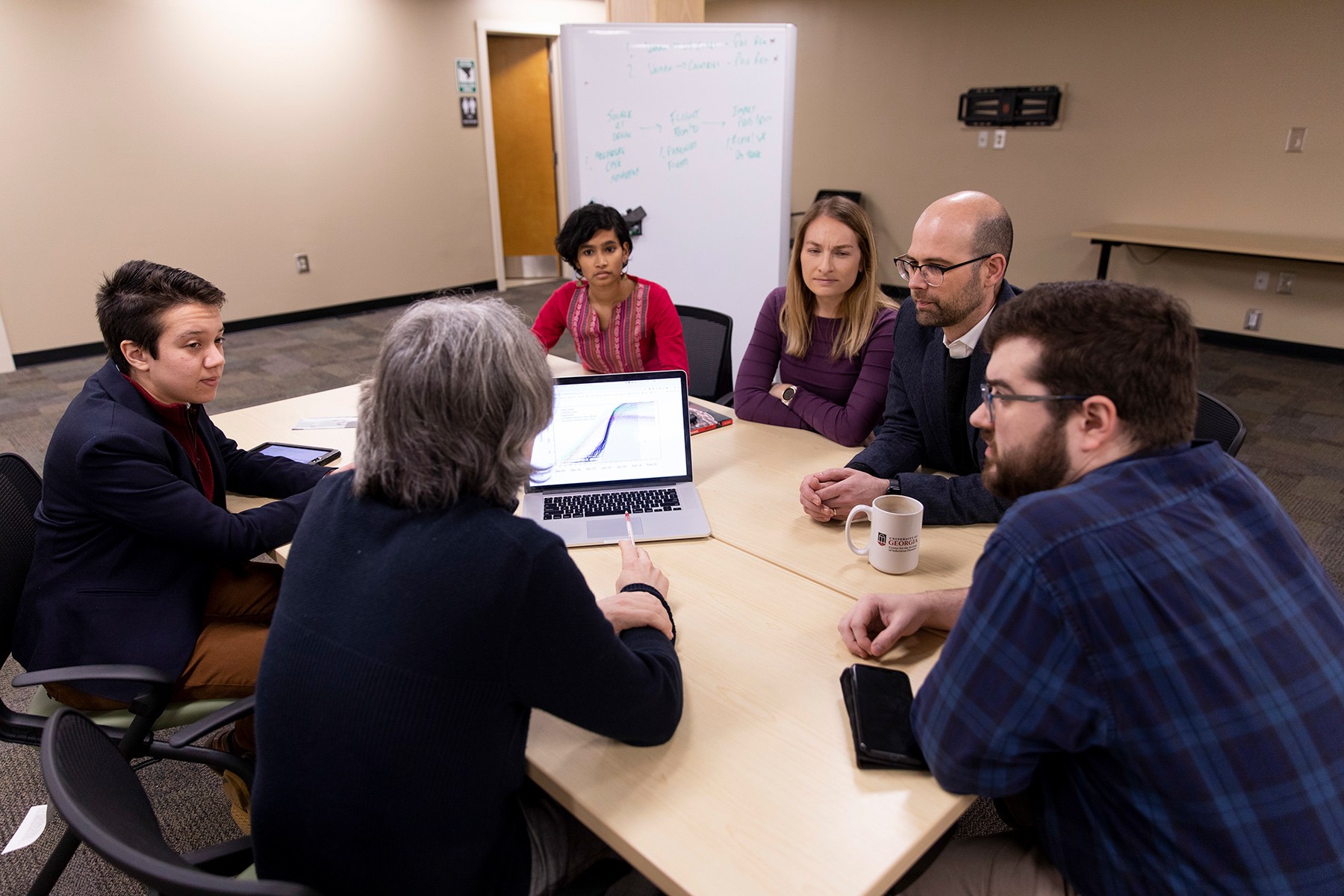Fifty faculty members to be recruited over the next two years
As data science and artificial intelligence transform a range of fields, the University of Georgia is making a significant investment in faculty with expertise in using big data to address some of society’s most urgent challenges.
The Presidential Interdisciplinary Faculty Hiring Initiative in Data Science and Artificial Intelligence aims to recruit 50 faculty members who will educate students and advance research in data science and AI. Rather than being housed exclusively in a single department, however, the majority of UGA’s newly recruited faculty will focus on the fusion of data science and AI in cross-cutting areas such as infectious diseases, integrative precision agriculture, ethics, cybersecurity, resilient communities and the environment.
“At the University of Georgia, we are constantly seeking opportunities to expand our impact on society, to solve complex challenges, and to shape the future,” said President Jere W. Morehead. “This strategic hiring initiative will enable us to do that while building on our excellence in teaching, research and service.”
The cluster hiring initiative, scheduled for completion over a two-year period, stems from the work of the Task Force on Academic Excellence charged by Provost S. Jack Hu shortly after he joined UGA in 2019. Composed of faculty and academic leaders across campus, the task force examined the university’s areas of strength and opportunity to guide strategic investments that maximize the institution’s impact.
“This hiring initiative builds on the expertise of our existing faculty and leverages our strength as a comprehensive research institution with a land-grant mission of service,” Hu said. “It will give students new learning opportunities while sparking transformative discoveries.”
Clusters of expertise
In a reflection of just how integral data science and AI have become to research and discovery, UGA’s 50 new faculty hires will be recruited in eight interdisciplinary clusters that focus on broad themes.
The cluster focused on artificial intelligence, data science and the dynamics of infectious diseases, for example, involves the university’s Odum School of Ecology, College of Public Health, College of Engineering and Franklin College of Arts and Sciences. It enhances the research capacity of units such as the Center for the Ecology of Infectious Diseases and the Institute of Bioinformatics as well as university’s capacity to deliver courses in high-demand subjects such as infectious disease epidemiology.
The Precision One Health Initiative is a partnership of five academic units. It seeks to recruit faculty with expertise in using data science to develop individually tailored prevention and treatment protocols for diseases that include autoimmune and neurogenerative diseases and cancer. The ethical use of data and AI is the focus of another cluster, involving the Franklin College of Arts and Sciences and Terry College of Business.
Opportunities for students
The demand for data literacy skills, which include an understanding of how data can be used in multiple disciplines, has risen dramatically in recent years.
Eleven of the top 15 careers in the most recent LinkedIn Emerging Jobs Report are related to AI or data, and the collection and analysis of large data sets is reshaping scores of other fields as well. Consider a marine scientist who uses machine learning to analyze data on ecosystem health, an engineer who designs secure sensors for internet-connected technology, or a pharmaceutical scientist who blends computational and experimental research to develop new therapeutics, to name just a few examples.
At UGA, degree programs in computer science, data science, and cybersecurity and privacy are complemented by certificate programs in informatics and applied data science that are open to students from any major. Interdisciplinary units such as the Georgia Informatics Institutes and the Institute for Artificial Intelligence bring students from different majors together and foster collaboration among faculty in multiple departments.
“The multidisciplinary nature of UGA’s approach to data science and artificial intelligence reflects the fact that data literacy has emerged as an essential component of career success and engaged citizenship,” said Rahul Shrivastav, vice president for instruction.
The hiring initiative in data science and artificial intelligence continues a series of investments in talent that have recruited more than 100 faculty members, in addition to those hired at the school and college level, since 2013. A brain and behavioral health cluster hiring initiative, which began with the recruitment of the inaugural Isakson Chair and Georgia Research Alliance Eminent Scholar in Parkinson’s Research, is also underway based on the work of the task force, as is a hiring initiative focused on integrative precision agriculture.
Data science and artificial intelligence clusters
The Presidential Interdisciplinary Faculty Hiring Initiative in Data Science and Artificial Intelligence aims to recruit 50 faculty members in areas of strategic importance. The clusters are:
- Artificial Intelligence, Data Science and the Dynamics of Infectious Diseases
- Environmental Artificial Intelligence
- Ethics, Data and AI
- Precision One Health Initiative
- Secure AI Systems for Biomedical Applications
- Integrative Precision Agriculture Center of Excellence
- Machine Learning Applications in Cyber-Physical Systems Security
- Resilient Infrastructure for Sustainability and Equity

